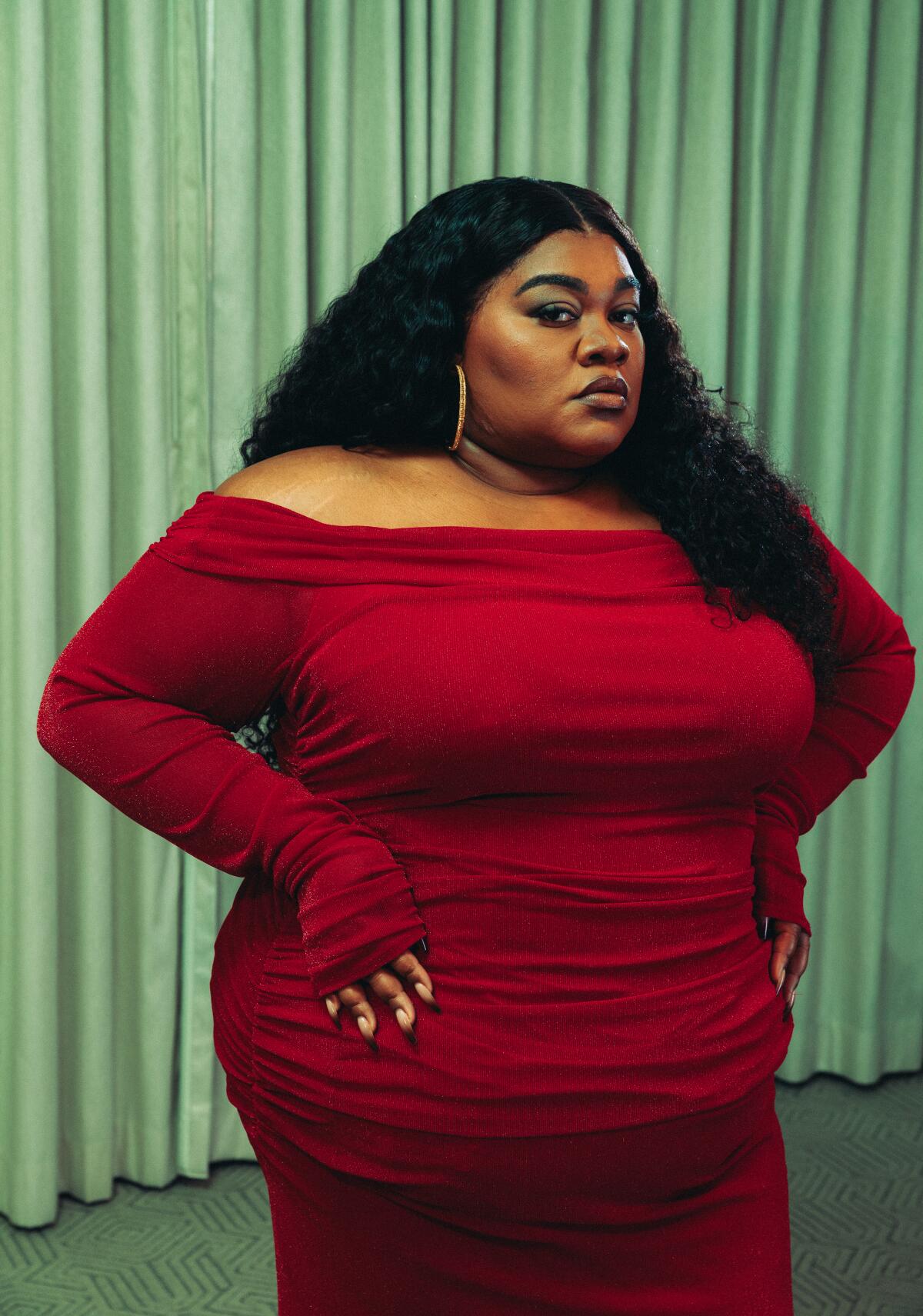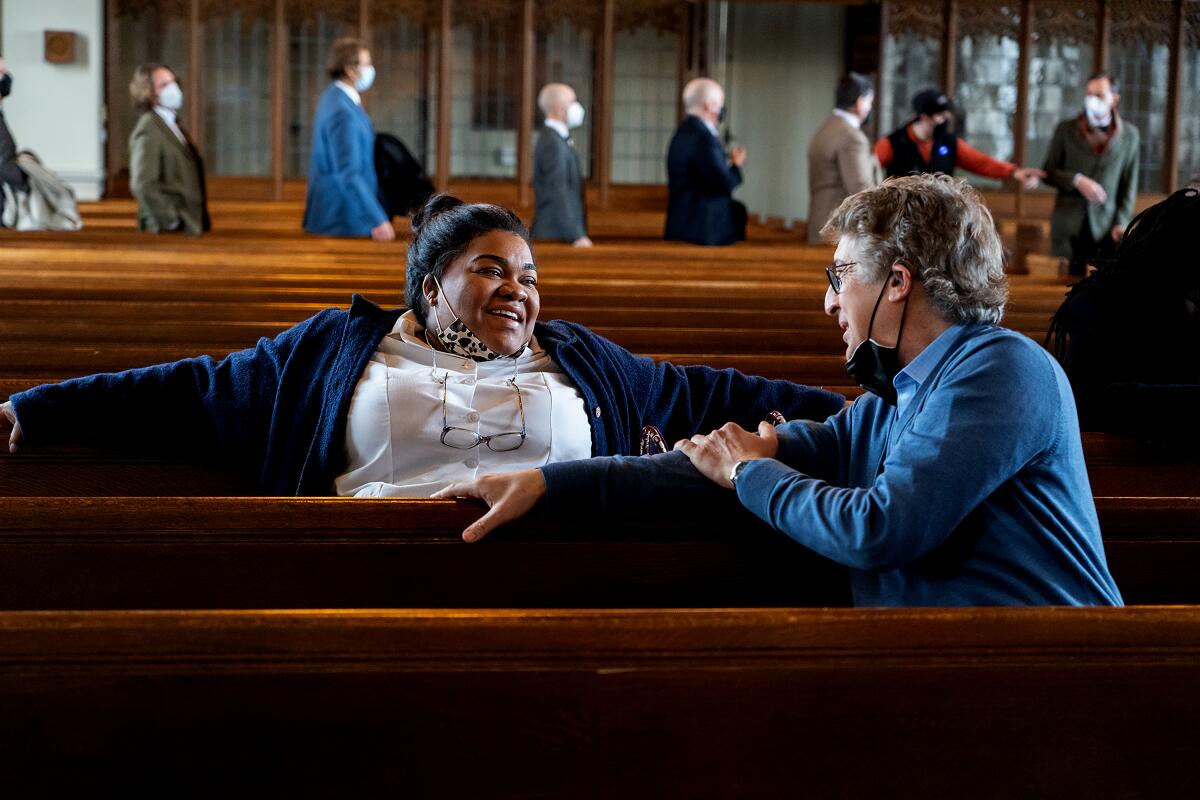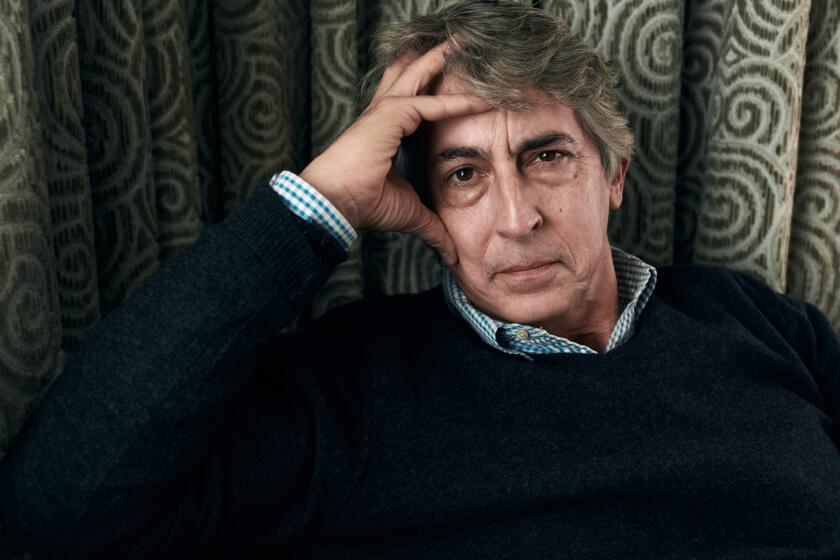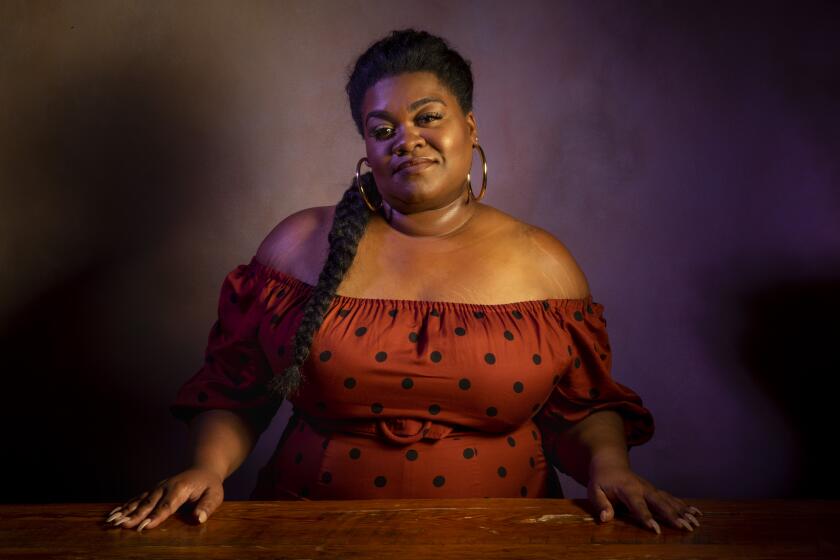With ‘The Holdovers,’ Da’Vine Joy Randolph finds herself with a seat at the table

- Share via
In “The Holdovers,” Da’Vine Joy Randolph plays Mary Lamb, the cafeteria manager and head cook at a snooty New England boys’ boarding school in 1970. Mary, grieving the death of her son in Vietnam, is one of the few Black faces on the Barton Academy campus. Cooking for spoiled white kids, displaced from the rest of her family, she reveals her resentment with a cutting look here, a sly comment there. She carries a sense of not belonging.
Randolph, who grew up in prep and performing arts schools and earned her MFA from the Yale School of Drama, could relate.
“I know what it’s like to be in predominantly white situations in the educational system,” she said in a video interview from Los Angeles. “My parents are educators, and I went to performing arts schools, but in particular prep schools and the Ivy League. Going there as a person of color is a very unique experience, and it can sometimes be a lonely one.”
In cat-eye glasses and a stylish black sweater, Randolph exudes quiet confidence. A Philadelphia native, she’s game to talk sports; told that it’s a good time to be an Eagles fan, she responds, “It’s always a good time to be an Eagles fan.” Though she speaks of feeling impostor syndrome over her success, she seems very comfortable in her own skin.
The film, says the director, is trying to take the idea of the period film “one step further”: not just to conjure up the mood of a bygone time, but to recapture a movie-making sensibility that it pioneered.
It’s been a whirlwind few years for Randolph, already considered a front-runner in the supporting actress Oscar race. She’s been scoring TV roles left and right: as a skeptical police detective in “Only Murders in the Building”; as an opinionated record store clerk in “High Fidelity.” She was probably the best thing about HBO’s disastrous “The Idol,” going with the flow as a talent manager sucked into the orbit of a sociopathic music producer. Her breakout movie role came in “Dolemite Is My Name,” in which she held her own as a bawdy comedian-singer opposite Eddie Murphy.
When “Holdovers” director Alexander Payne presented her with David Hemingson’s script, she was overjoyed with what she read.
“I was happily surprised to see the amount of context Mary had, the emotion of a completed story arc,” she says. ”That might sound trivial and silly, but it’s not always available, to a person of color in particular. Oftentimes I try to work with the creatives to get some of that on the page. So I was really happy to see it was already on the page.”

Randolph, 37, has several signature moments in “The Holdovers.” In the middle of the film, Mary goes to a Christmas party with Paul Hunham, a misanthropic history teacher played by Paul Giamatti, and Angus Tully (newcomer Dominic Sessa), a Barton student stuck on campus with Mary and Hunham over the holidays. Feeling the recent loss of her son, a former Barton student, Mary gets to drinking whiskey and playing sad Christmas music on the stereo. When a man bluntly asks her to play something more upbeat, she snarls, cries and gives the man a look that could draw blood. Moments later she’s sobbing in the kitchen.
Among its many strengths, “The Holdovers” is wise to the messiness of grief. This is largely thanks to Randolph’s carefully modulated performance.
“I wanted to show the different stages of grief, and I wanted to show the nuance of it,” she says. “Grief is complicated, like love, and it’s not always just boohoo crying or pissed off and angry. It’s funny sometimes, in a morbid kind of way. It’s awkward. It’s many, many different things.”
For Payne, a two-time Oscar winner (for co-writing both “Sideways” and “The Descendants”), Randolph’s ability to blend comedy and drama made her the perfect choice to play Mary.
“For largely dramatic roles, I’ve long cast actors with comic chops; they know how to make emotions real but without drear,” the director said in an email. “A classically trained actress equally adept in comedy and drama, Da’Vine brought total reality to the role of Mary, embodying a broad spectrum of emotion and humor. And I’d previously seen Da’Vine in the wonderful “Dolemite Is My Name,” where she stole every scene.”
Actress Da’Vine Joy Randolph had to turn to her father to get insights into the little-known comic she portrayed in Eddie Murphy’s ‘Dolemite Is My Name’
Sessa, making his film debut in “The Holdovers,” found inspiration in Randolph’s experience and decision-making, and the way she took control of her character.
“She really inspired me to take ownership of my character, because it takes a certain level of confidence to get there, especially for me,” he said in a video interview. “Because you don’t want to screw with the writing. To see her make really distinct choices for her character and take the time to specify who this person was in this story and what her character provides for the other characters, it allowed me to say, ‘OK, this role is mine, and I can approach this in a similar way.’”
Randolph sees “The Holdovers” as a turning point in her career, one of those hinge moments and ideal experiences that lead to the next chapter. Better parts. More rewarding work.
Respect.
“I would like to continue to work at this standard, and for this to be the bar that I set for myself,” she says. “I hope that creatives, directors and studio heads are made aware and know this is where we have to meet Da’Vine now. I want to continue to have quality work in which characters of color and females are being portrayed with integrity.”
More to Read
From the Oscars to the Emmys.
Get the Envelope newsletter for exclusive awards season coverage, behind-the-scenes stories from the Envelope podcast and columnist Glenn Whipp’s must-read analysis.
You may occasionally receive promotional content from the Los Angeles Times.








